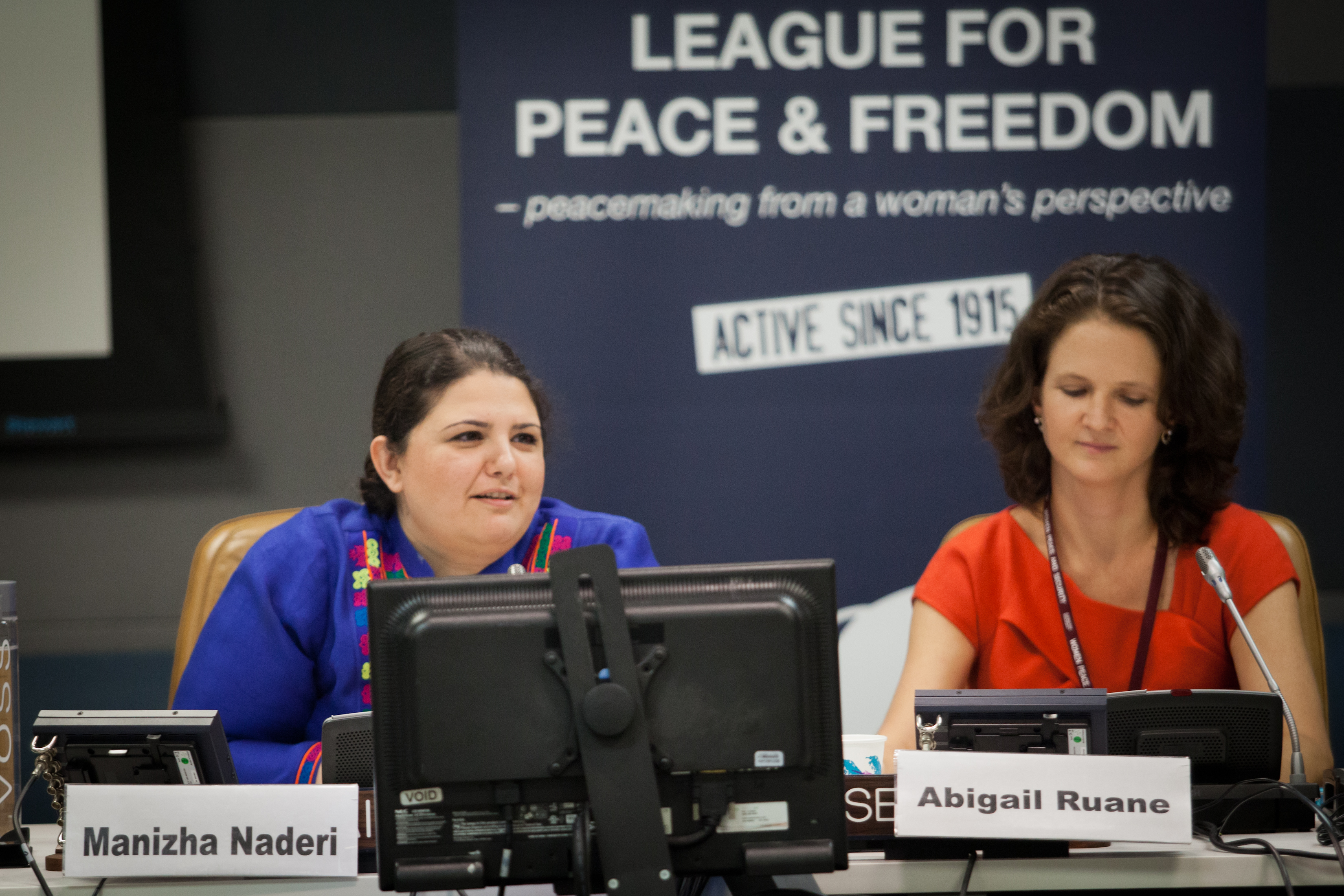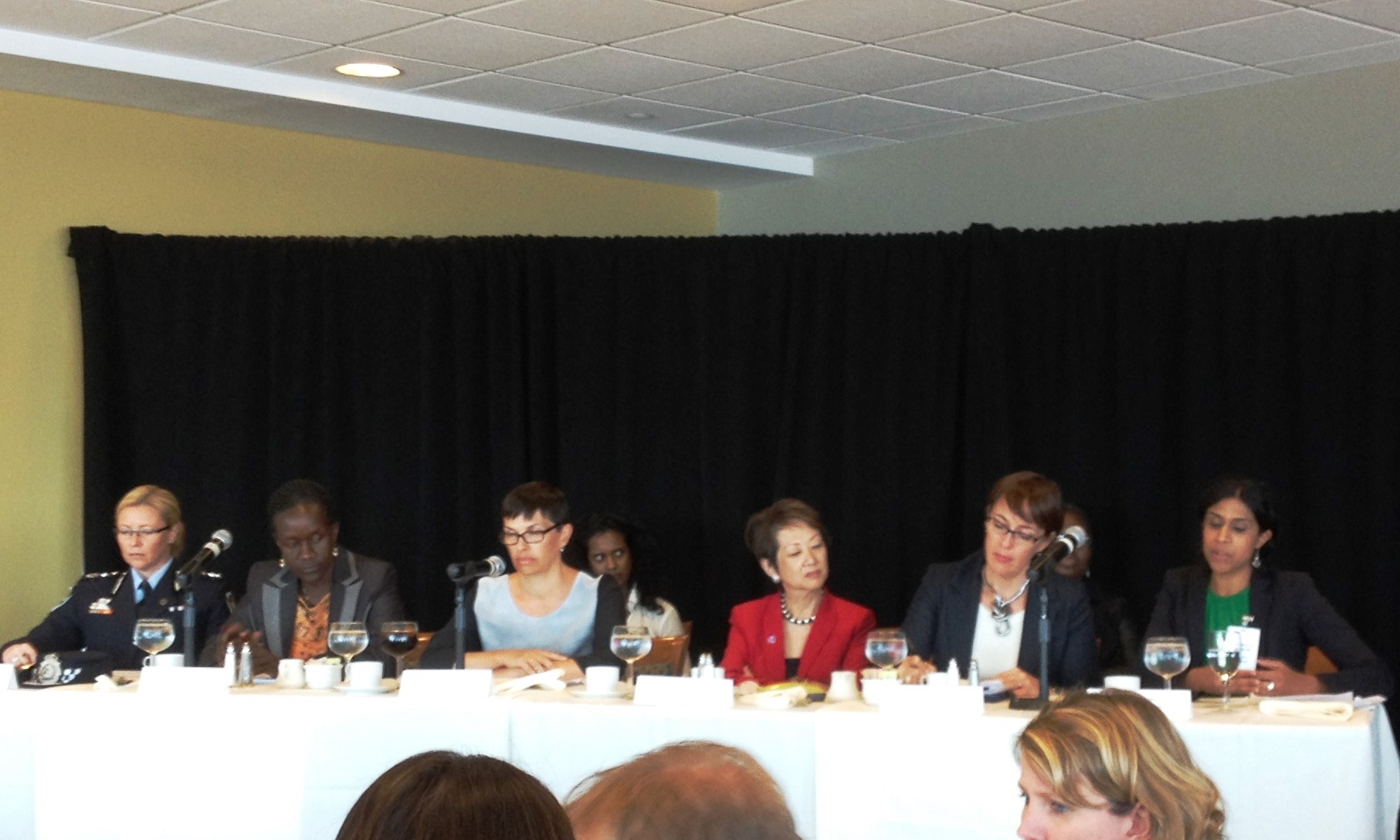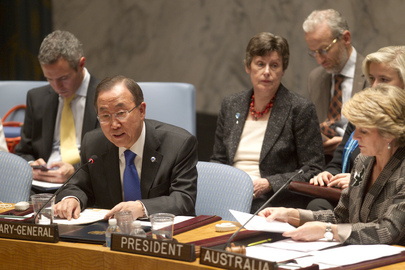Towards Peace in Syria; Nigeria Launches SCR 1325 Action Plan--PeaceWomen E-News, September 2013
If you have any difficulty reading this newsletter in HTML, please view it online.
When crisis calls, how must we act? As a peace organization with the big picture in mind, WILPF promotes preventing conflicts before they start by investing in equality and peace rather than militarized inequality and violence. Addressing the root causes of war is key to sustainable peace in the long term. But in the short term, when a legacy of investing in violence exists, what then? What do we do to pick up the pieces?

This month, WILPF sections around the world protested possible military intervention in Syria and advocated for a political solution to the crisis with women's full and equal participation. In doing so, WILPFers showed how it is not just about acting, but about HOW we act that determines whether we perpetuate or transform violence into peace. WILPF-UK collected 500 petition signatures against intervention and contributed to demonstrations in Edinburgh, London and Glasgow. WILPF-US took part in national days of action and mobilized members across the country to demand that President Obama and members of congress stop the drumbeat for war and invest in an inclusive political solution. WILPF-Norway sent their government a letter on September 2nd urging them to maintain their stance against Syrian military intervention. PeaceWomen worked with WILPF's Reaching Critical Will and Human Rights programmes to draft WILPF's statement against war in Syria and advocate for strengthened support for an inclusive political solution to the crisis.
As crises continue in Syria and around the globe, WILPF/PeaceWomen continues our work to promote peace and security for all by strengthening gender justice and women's participation and rights in issues of peace and security in Syria and elsewhere. PeaceWomen participated in the September 6th event on women and peacebuilding co-hosted by the current Security Council President Australia's permanent mission to the UN, and worked along with partners in New York and WILPF-Australia to strengthen consideration of WPS issues in this month's Small Arms Light Weapons (SALW) debate. Our September 13th Women, Peace and Security (WPS) lecture addressed the situation of women in Afghanistan before the Council's quarterly Afghanistan debate and highlighted the importance of government reform and civil society engagement to strengthen and ensure women's security and equal human rights. We also continued working with the Post-2015 Women's Coalition to strengthen connections between women, peace and security and development including by participating in the September 21st People's General Assembly on Development Justice.
As the UN General Assembly meets this week, we will be working with WILPF's Reaching Critical Will (RCW) Programme to monitor country statements and key events for gender and disarmament issues. We will also bring attention to Women, Peace and Security concerns at the myriad events going on including on peacebuilding, human rights, sexual violence, small arms and light weapons, and the Middle East North Africa (MENA) region. Stay updated and let us know what actions you are taking to hold your government accountable!
In this edition, we feature a statement by WILPF-Nigeria welcoming the new Nigeria SCR 1325 National Action Plan. We address Australia's September presidency and commitments on the Women, Peace and Security agenda. Additionally, we highlight the UN High Level Forum on the Culture of Peace.
WILPF-Nigeria Celebrates Launch of Nigeria SCR 1325 NAP
Nigeria launched its National Action Plan (NAP) on the implementation of the United Nations Security Council Resolution (UNSCR) 1325 on Tuesday, August 27th, 2013, at the Federal Capital Territory of Abuja. The event was hosted by the Nigerian Federal Ministry of Women Affairs, who was responsible for driving the process of the National Action Plan in partnership with development partners.  WILPF Nigeria actively participated in the regional consultations that took place and thus in recognition of the work we have been doing on the ground, were invited to partake in the event. There was a technical session with civil society organizations and other organizations present, chaired by the consultants that helped drive the process.
WILPF Nigeria actively participated in the regional consultations that took place and thus in recognition of the work we have been doing on the ground, were invited to partake in the event. There was a technical session with civil society organizations and other organizations present, chaired by the consultants that helped drive the process.
WILPF Nigeria is very happy at this recent development and will continue to work in consultation with sister organizations and the Federal Ministry of Women Affairs and Social Development to create awareness on the NAP and closely monitor the implementation process. We look forward to contributing our insights about lessons learned at UNWomen's Global Review of National Action Plans in New York this November 2013.
We are happy to note that most of the inputs and concerns raised were taken care of in the final document. We however also note that the NAP is not an end but rather a means to an end, and therefore implore the Government to work in close collaboration with civil society to ensure successful implementation of the process and also to allocate funds in the budget to ensure smooth implementation.
WPS Lecture Series Highlights the Situation of Women in Afghanistan
On September 13, 2013, PeaceWomen, along with the Permanent Mission of Liechtenstein to the United Nations and the Princeton University Liechtenstein Institute on Self-Determination, hosted our ninth Women, Peace and Security (WPS) lecture on “The Situation of Afghan Women: 2014 and Beyond.” The event, which featured Executive Director of Women for Afghan Women Ms. Manizha Naderi, highlighted the need for government reform to uphold women's rights and security, and the critical role of civil society in strengthening women's capacity and access to community and political processes. Held immediately before the Security Council's quarterly debate on Afghanistan, the event brought particular attention to recommendations by the NGO Working Group on Women, Peace and Security and WILPF, which stress that the Council should call for strengthened action to ensure women's security, participation, and rights in post-conflict processes.

Naderi shared experiences about securing, protecting, and advancing the human rights of Afghan women and girls through her work with Women for Afghan Women. Through the work of support centers both in New York and across 10 provinces in Afghanistan that include human rights education, Women for Afghan Women has been able to directly reach over 8,000 Afghan women. Naderi highlighted the human security risks of formal and informal political institutions, and emphasized the need for government action to promote gender justice through strengthened and transparent role of law that upholds women's human rights and invests in women-led civil society as key in implementing the Women, Peace and Security agenda. As American troops leave the country, Naderi's comments are a reminder of the importance of strengthened support for post-conflict reconstruction that promotes gender justice and builds the capacity of women and women-led civil society to build peace from the ground up.
Australia Event Emphasizes Need for Concrete Action for Women in PeaceBuilding
On Friday, September 6, 2013, Conciliation Resources, the NGO Working Group on Women, Peace and Security (WPS) and the Mission of Australia to the United Nations (UN), held an event on “Women Building Peace.” Introduced by Australian Ambassador to the UN Gary Quilian and moderated by Australian Global Ambassador for Women and Girls, Penny Williams, the panel featured diverse insights from Karima Obina Lanyero (Acholi Religious Leader's Peace Initiative, Uganda), Zahbia Yousuf (Conciliation Resources), Mandy Newton (Australian Federal Police), Judy Cheng-Hopkins (UN Assistant Secretary General for Peace Building Support), and Sarah Taylor (NGO Working Group on Women, Peace and Security). The event launched the Accord Insight publication of the same name, and addressed contemporary experiences, challenges, and innovations in women's peacebuilding practice.
Aligned with WILPF's belief that calls for concrete action to strengthen gender equality and women's rights and participation in peacebuilding, Yousef highlighted the importance of an integrated approach to long-term and sustainable peace that invests in conflict prevention.  Further, she asked for efforts to link up multi-track peace efforts and attention to such issues as the social and economic welfare of survivors of sexual violence in conflict. Lanyero brought in experiences from the Ugandan conflict to emphasize how women's presence is too often made invisible, and how the exclusion of women in peace talks - such as involvement as “observers” rather than participants - handicaps women and ensures a “raw deal” where “the issues that affect us [women] are not going to come out.” Cheng-Hopkins stressed how failing to invest in women as key change agents, including through financing, training, and capacity-building, is “short sighted and shortchanging” women given the international community's vested interest in keeping and sustaining peace. Newton reflected on how women's participation and leadership can have a ripple effect in inspiring further women's inclusion and bringing in fresh perspectives enabling creative change. Finally, Taylor reminded participants of concrete opportunities for strengthening policy and practice in this area. With Australia as the UN Security Council president this month, WILPF looks forward to seeing how these verbal commitments translate into discussion and concrete outcomes.
Further, she asked for efforts to link up multi-track peace efforts and attention to such issues as the social and economic welfare of survivors of sexual violence in conflict. Lanyero brought in experiences from the Ugandan conflict to emphasize how women's presence is too often made invisible, and how the exclusion of women in peace talks - such as involvement as “observers” rather than participants - handicaps women and ensures a “raw deal” where “the issues that affect us [women] are not going to come out.” Cheng-Hopkins stressed how failing to invest in women as key change agents, including through financing, training, and capacity-building, is “short sighted and shortchanging” women given the international community's vested interest in keeping and sustaining peace. Newton reflected on how women's participation and leadership can have a ripple effect in inspiring further women's inclusion and bringing in fresh perspectives enabling creative change. Finally, Taylor reminded participants of concrete opportunities for strengthening policy and practice in this area. With Australia as the UN Security Council president this month, WILPF looks forward to seeing how these verbal commitments translate into discussion and concrete outcomes.
Click here to learn more about the Conciliation Resources's Accord Insight publications.
High Level Forum on the Culture of Peace
On September 6, 2013, the President of the UN General Assembly, in cooperation with the Global Movement for a Culture of Peace, convened a High Level Forum to address the implementation of the 1994 UNGA Programme of Action on the Culture of Peace. The daylong event featured several keynote addresses, a high level event, and several panels. Panels were dedicated to “The Role of Interfaith Cooperation in Promoting a Global Culture of Peace”; “The Culture of Peace as the Agenda for a New Global Civilization”; and “Strategy for Advancing the Implementation of the UN Programme of Action on Culture of Peace.” Participants included UNGA President Mr. Vuk Jeremic, Abigail Disney of Peace is Loud, (1998-99) UNGA Chair of the UN Declaration and Programme of Action on a Culture of Peace H. E. Anwarul K. Chowdhury, various religious leaders, among others.

The forum highlighted the need for building a global culture of peace throughout education and integration, where women and youth are main actors of peacebuilding. Anwarul Chowdhury, representing civil society and The Global Movement for The Culture of Peace, highlighted that development, peace and women participation are highly interconnected, with all three needing to co-exist together in order to facilitate real concrete change and action. Dipu Moni, Minister for Foreign Affairs of the People's Republic of Bangladesh, stressed the importance of having women at the table of negotiation about peace. Lakshmi Puri (UNWomen) stressed that there cannot exist a culture of peace when half of the world's population cannot participate. Further, Grace Akallo (United Africans for Women and Children's Rights) emphasized the crucial role of gender justice and gender perspectives in areas such as poverty, health, education and environment, all pillars of the Millennium Development Goals. While the importance of women's participation was recognized, it was not a major area of focus in the overall discussion.
Click here for read the UN Secretary-General Ban Ki-moon's report on the progress towards the MDG.
